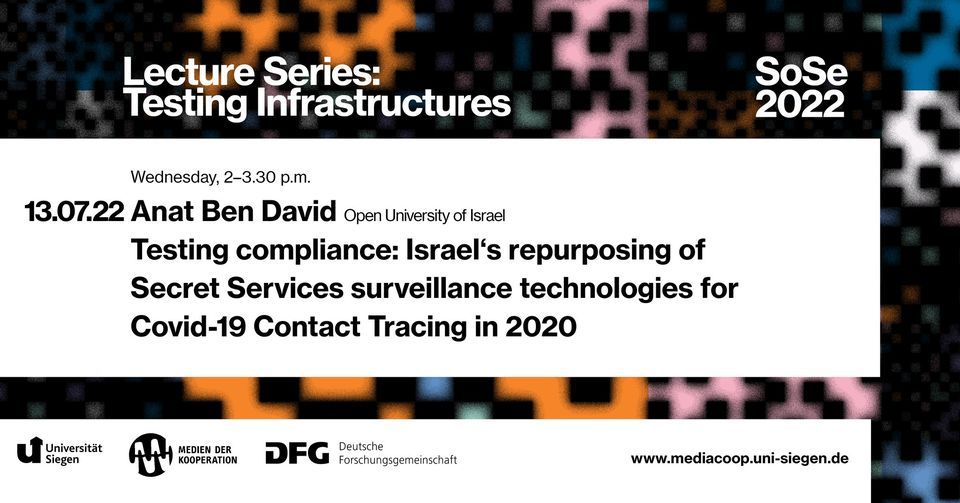
Advertisement
"Testing compliance: Israel‘s repurposing of Secret Services surveillance technologies for Covid-19 Contact Tracing in 2020" Anat Ben David (Open University of Israel)__________________________________________
With the rapid unfolding of the COVID-19 global pandemic, Israel was one of the first states outside East Asia to impose involuntary surveillance measures to combat the virus. The government utilized the country’s permanent state of exception to bypass the parliament and deploy a hitherto classified anti-terrorism tool developed by its internal security service (Shin Bet) to track the location of COVID-19 patients and notify citizens who have been near an identified patient to self-quarantine. This talk explores the unprecedented repurposing of an anti-terrorism tool for addressing a civic health crisis through the lens of testing infrastructures. It argues that the mass infrastructural test was deployed as an a priori policy to generate compliance through securitization. This policy had to be justified at any price, including publishing compromised public data that hid the actual low-efficiency rates of Shin-Bet’s contact tracing.
The talk explores how data essentialism and securitization were used for solidifying the underlying infrastructural surveillance that made the Corona-tracking possible (Gekker & Hind, 2019). Then, following critique about the emergence of data gaps and inequalities in access to data during the pandemic in the global south (Milan and Treré 2020), I further portray gaps in the quality, quantity, and accessibility of two types of government pandemic data: data about the people – the secretive, mass-surveillance data used for infrastructural testing; and data for the people – the public, low-quality, incomputable reports for justifying mass surveillance. Finally, I illustrate these gaps by analyzing four infrastructural dataveillance practices used by the Israeli government in 2020: the repurposing of the Shin-Bet’s anti-terrorism infrastructure for contact tracing; an open-source contact tracing app; the “national index” dashboard that measured city-level compliance with lockdowns, created for the government by behavioral economist Dan Ariely; and the “Philosopher’s Stone” - a plan promoted by the Ministry of Defense to team up with the infamous espionage company NSO, to build an algorithmic system that would rank citizens by a ‘contagiousness risk factor.’
__________________________________________
Anat Ben-David is an associate professor in the department of Sociology, Political Science and Communication at the Open University of Israel. She is co-founder of the Open University's Open Media and Information Lab (OMILab). Her primary research areas are Web history and web archives, Digital STS, critical data studies, and digital and computational methods for Web research.
__________________________________________
On the lecture series: "Testing Infrastructures"
From QR codes used to verify COVID-19 vaccination status’ to cloud software used to train machine learning models, infrastructures of testing are proliferating. Whilst the infrastructures themselves come in different forms - from ‘off the shelf’ systems to tailor-made technologies - they all have a capacity to generate specific ‘test situations’ involving an array of different actors from ‘ghost’ workers to python scripts. An increasing reliance on digital platforms, protocols, tools, and procedures has led to a redistribution of testing itself: not just where testing takes place, and who performs the testing, but who has access to, and control over, mechanisms for testing, test protocols and of course, test results. In this lecture series, we focus on the practices making up the test infrastructures and explore different perspectives to make sense of the realities enacted by testing.
We invite our lecture guests to ask: how do testing infrastructures engender the construction of specific testing routines and practices? What kinds of affective experiences, reactions, and responses are generated through testing? Here we invite reflection on how testing infrastructures oft fade into the background, pointing to a tapestry of maintenance and repair practices. Lastly, what are the ways in which we can evaluate the role of digital infrastructures more broadly? This includes the challenge of what novel test methods can be developed and actually ‘tested’ to gain a better understanding of how infrastructures work. Our exploration of test practices in this context is interwoven with the search for test media that bind actors together or create barriers; that enable cooperation or declare it impossible.
__________________________________________
Possible questions include (but are not limited to):
- What are the implications of testing in different social situations and in what moments do they come to the fore?
- When and where are tests conducted—for whom and what, through whom and what, and by whom and what actors?
- What are digital practices for/of testing and with what types of data do testing infrastructures support?
- What other practices spawn from distributed testing? Think of practices of passing and obfuscation within nested situations of testing and the outsourcing of ‘validation work’ as constructions that govern.
- What methodological strategies are there to make test procedures and their foundations transparent?
- Can different politics of testing be distinguished? If so, where and under what conditions?
- Can we demarcate between embodied testing and disembodied testing?
__________________________________________
Veranstaltungsort
Room AH-A 217/18, Herrengarten 3, 57072 Siegen
__________________________________________
https://www.mediacoop.uni-siegen.de/de/veranstaltungen/anat-ben-david-open-university-of-israel/
Advertisement
Event Venue & Nearby Stays
Herrengarten 3, 57072 Siegen, Deutschland, Siegen, Germany
